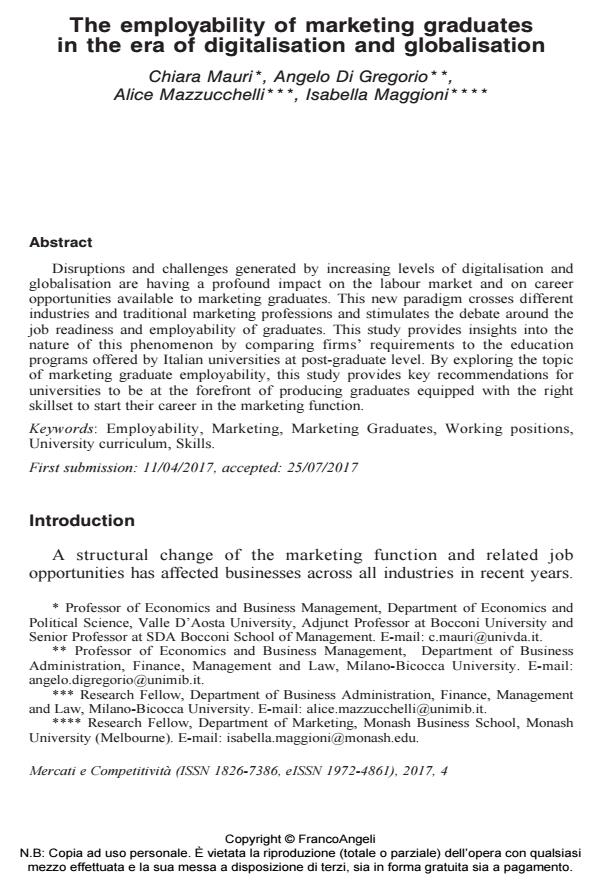The employability of marketing graduates in the era of digitalisation and globalisation
Titolo Rivista MERCATI & COMPETITIVITÀ
Autori/Curatori Chiara Mauri, Angelo Di Gregorio, Alice Mazzucchelli, Isabella Maggioni
Anno di pubblicazione 2017 Fascicolo 2017/4
Lingua Inglese Numero pagine 22 P. 103-124 Dimensione file 179 KB
DOI 10.3280/MC2017-004006
Il DOI è il codice a barre della proprietà intellettuale: per saperne di più
clicca qui
Qui sotto puoi vedere in anteprima la prima pagina di questo articolo.
Se questo articolo ti interessa, lo puoi acquistare (e scaricare in formato pdf) seguendo le facili indicazioni per acquistare il download credit. Acquista Download Credits per scaricare questo Articolo in formato PDF

FrancoAngeli è membro della Publishers International Linking Association, Inc (PILA), associazione indipendente e non profit per facilitare (attraverso i servizi tecnologici implementati da CrossRef.org) l’accesso degli studiosi ai contenuti digitali nelle pubblicazioni professionali e scientifiche.
Disruptions and challenges generated by increasing levels of digitalisation and globalisation are having a profound impact on the labour market and on career opportunities available to marketing graduates. This new paradigm crosses different industries and traditional marketing professions and stimulates the debate around the job readiness and employability of graduates. This study provides insights into the nature of this phenomenon by comparing firms’ requirements to the education programs offered by Italian universities at post-graduate level. By exploring the topic of marketing graduate employability, this study provides key recommendations for universities to be at the forefront of producing graduates equipped with the right skillset to start their career in the marketing function.
Parole chiave:Employability, Marketing, Marketing Graduates, Working positions, University curriculum, Skills.
- Employability skills for future marketing professionals Angelo Di Gregorio, Isabella Maggioni, Chiara Mauri, Alice Mazzucchelli, in European Management Journal /2019 pp.251
DOI: 10.1016/j.emj.2019.03.004 - Directions of formation of digital competencies of personnel of large companies Matvey Oborin, in Moscow University Economics Bulletin 47576058/2021 pp.163
DOI: 10.38050/0130010520216.8 - INTERNATIONAL CONFERENCE ON TEXTILE AND APPAREL INNOVATION (ICTAI 2021) Alena Vankevich, Iryna Kalinouskaya, Olga Zaitseva, pp.060003 (DOI:10.1063/5.0078827)
Chiara Mauri, Angelo Di Gregorio, Alice Mazzucchelli, Isabella Maggioni, The employability of marketing graduates in the era of digitalisation and globalisation in "MERCATI & COMPETITIVITÀ" 4/2017, pp 103-124, DOI: 10.3280/MC2017-004006